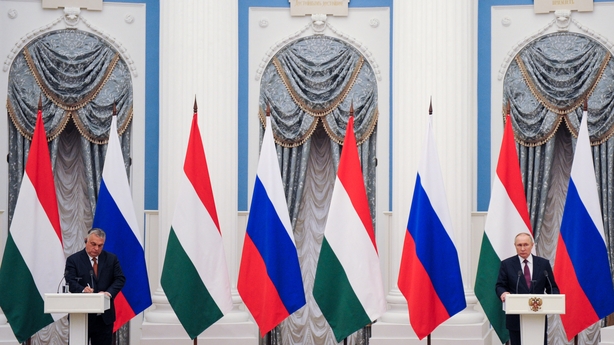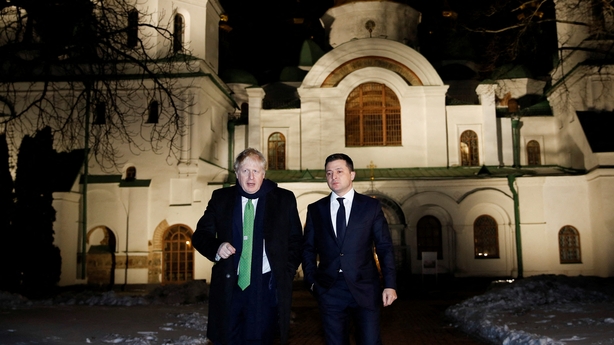Russian President Vladimir Putin said today he hoped that Moscow and the West could find a solution to the raging security crisis over Ukraine, but also accused Washington of using Kyiv as a "tool" against Russia.
Russia has massed more than 100,000 troops near Ukraine's borders, while denying plans to invade - an action that the US and its allies have warned would trigger tough sanctions.
The West last week formally rejected Russian demands to bar Ukraine from ever joining NATO and pull out NATO forces from eastern Europe, while expressing willingness to talk about arms control and confidence-building measures.
"I hope that in the end we will find a solution, although it will not be simple," Mr Putin said, indicating he was ready for more talks with the West.
We need your consent to load this rte-player contentWe use rte-player to manage extra content that can set cookies on your device and collect data about your activity. Please review their details and accept them to load the content.Manage Preferences
Speaking to reporters after talks with Hungarian Prime Minister Viktor Orban in Moscow, Mr Putin also said Washington's main goal was to contain Russia.
"It seems to me that the United States is not so much concerned about the security of Ukraine ... but its main task is to contain Russia's development," Mr Putin said.
"In this sense Ukraine itself is just a tool to reach this goal. This could be done in various ways," he said, including by getting Russia involved in an armed conflict.
The Russian leader said that if Ukraine joined NATO, Russia could be sucked into an armed conflict with the military alliance over Moscow-annexed Crimea.
"Let's imagine that Ukraine is a NATO country and begins a military operation in Crimea, on Russia's sovereign territory," Mr Putin said.
"What, do we have to fight the NATO alliance? Did anyone think about that? Looks like no."
Mr Putin also said that French President Emmanuel Macron could come to Moscow for talks "in the near future".
Mr Orban said "the differences are substantial", but the differences between the West and Russia on the Ukraine crisis are "bridgeable".
"The situation is serious, the differences are substantial," Mr Orban told a joint press conference.

"But the existing differences in positions are bridgeable, it is possible to make such an agreement that both guarantees peace and Russia's security, and that is also acceptable for NATO members."
Mr Orban's trip had been fiercely criticised by Hungary's opposition, who accused him of betraying national interests amid growing fears in the West of a Russian attack on Ukraine.
Mr Orban, who has led NATO member Hungary since 2010, has had friendly relations with Mr Putin while presiding over deteriorating ties with the European Union.
He also argued that sanctions against Russia were counter-productive. The US and EU have warned Russia it will face sanctions if it invades Ukraine.
"I considered this visit of mine as a peace mission as well," he said.
"I told President Putin that the EU is united and there is not one EU leader who would want a conflict with Russia. This is especially true of us, Central Europeans."
'Clear and present danger' - Johnson
Meanwhile, British Prime Minister Boris Johnson warned on a trip to Kyiv today that Russian forces massed on the border represented a "clear and present danger" to Ukraine.
"We see large numbers of troops massing, we see preparations for all kinds of operations that are consistent with an imminent military campaign," Mr Johnson said at a press conference with Ukraine's President Volodymyr Zelensky.
"It is vital that Russia steps back and chooses a path of diplomacy, and I believe that is still possible."
British sanctions will be automatically imposed on Russian commercial interests and individuals the moment any incursion into Ukraine takes place, Mr Johnson said.
Mr Johnson said Ukraine would resist any invasion.

"I think that perhaps the single most useful thing we can all do is get over to the Russian public, to citizens in Russia, thinking about this possibility, the reality that the Ukrainian army will fight," Mr Johnson said.
"There are 200,000 men and women under arms in Ukraine, they will put up a very, very fierce and bloody resistance.
"I think that parents, mothers in Russia should reflect on that fact and I hope very much that President Putin steps back from the path of conflict and that we engage in dialogue."
Mr Zelensky has signed a decree to boost his armed forces by 100,000 troops over three years and raise soldiers' pay, but said this did not mean war with Russia was imminent.
He urged MPs to stay calm and avoid panic as he hosted the leaders of the Netherlands, Britain and Poland - all NATO members - as part of efforts to defuse tension with Russia and shore up international support for Kyiv.
Read More:
Ukraine leader urges West not to stir 'panic' over Russia tensions
Is Russia prepared for full-scale invasion of Ukraine?
Russia, US square off at UN over Ukraine crisis
Mr Zelensky said a military conflict with Russia would not just involve Ukraine, but lead to a full scale war in Europe.
Despite the Russian troop build-up, Mr Zelensky has repeatedly pushed back against warnings by the US and other NATO allies that Russia could attack Ukraine at any moment.
"We must be united in domestic politics. You can be in opposition to the government, but you can't be in opposition to Ukraine," Mr Zelensky said.
There are currently nearly 250,000 people in Ukraine's armed forces, compared to Russia's overall strength of around 900,000.

